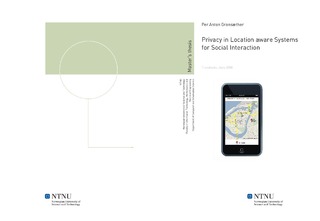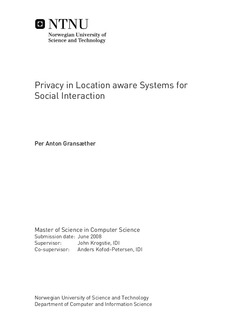| dc.contributor.advisor | Krogstie, John | nb_NO |
| dc.contributor.advisor | Kofod-Petersen, Anders | nb_NO |
| dc.contributor.author | Gransæther, Per Anton | nb_NO |
| dc.date.accessioned | 2014-12-19T13:32:19Z | |
| dc.date.available | 2014-12-19T13:32:19Z | |
| dc.date.created | 2010-09-03 | nb_NO |
| dc.date.issued | 2008 | nb_NO |
| dc.identifier | 347634 | nb_NO |
| dc.identifier | ntnudaim:4052 | nb_NO |
| dc.identifier.uri | http://hdl.handle.net/11250/250676 | |
| dc.description.abstract | Social network services like Facebook, and instant messaging services like MSN Messenger have gained an enormous popularity in just a few years, and are undoubtedly popular among users.hat happens when these networks are combined with information about the user s location? This master s thesis has investigated if people are willing to use systems that share the users location for the purpose of locating friends. It is also investigated if users of systems that shares their location behave in a different ways as a consequence of this location sharing. Finally, this thesis investigated if users of location sharing systems will get the feeling of loosing their personal privacy, and how privacy mechanisms can help the users not to get this feeling. These questions were investigated by developing a location-tracking social network service called The FriendRadar, which was developed for usage in Wireless Trondheim. Pupils from Trondheim Katedralskole were equipped with wireless devices to test the system in the environment. The logged data of the system was analysed and the users answered a questionnaire after the test period was completed. One user also participated in an interview. The results of these investigations show that the users did not use The FriendRadar very much, but according to the users answer to the questionnaire it seems that users are willing to use systems that share their location with others, if the benefit is that they can locate them back. It also indicates that the users do act in different ways because of the possibility to share their location. Users seem to use the fact that others can see their location deliberately to tell other their locations, but they do not avoid doing any actions. Further, it seems like spontaneous actions possibly can happen as a consequence of users seeing other s location. Users of the system did not show concerns about privacy while using the system, but they could imagine this being a problem in a system with larger user mass. The most important privacy mechanisms for a future location-tracking systems, seems to be able to turn the system off and reciprocity in location sharing. Together these results shows that if the right amount of privacy mechanisms are implemented to a location-tracking system, the system can both be privacy preserving and useful for the users. | nb_NO |
| dc.language | eng | nb_NO |
| dc.publisher | Institutt for datateknikk og informasjonsvitenskap | nb_NO |
| dc.subject | ntnudaim | no_NO |
| dc.subject | SIF2 datateknikk | no_NO |
| dc.subject | Program- og informasjonssystemer | no_NO |
| dc.title | Privacy in Location aware Systems for Social Interaction | nb_NO |
| dc.type | Master thesis | nb_NO |
| dc.source.pagenumber | 126 | nb_NO |
| dc.contributor.department | Norges teknisk-naturvitenskapelige universitet, Fakultet for informasjonsteknologi, matematikk og elektroteknikk, Institutt for datateknikk og informasjonsvitenskap | nb_NO |

